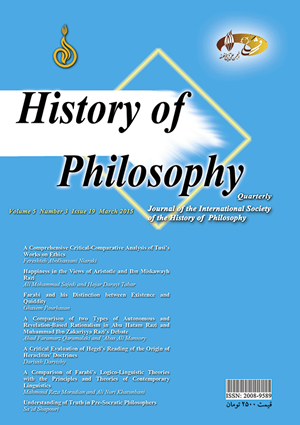A Comparison of two Types of Autonomous and Revelation-Based Rationalism in Abu Hatam Razi and Muhammad Ibn Zakariyya Razi’s Debate
Subject Areas : Etymology of philosophical termsAhad Faramarz Qaramaleki 1 , ‘Abas Ali Mansory 2 *
1 - Tehran University
2 - Tehran University
Abstract :
The studies on the development of the rationalist trend in the world of Islam usually discuss the challenges of rationalist groups with exoteric groups, including Ash‘ari mutikallimun and Sufists rather than compare or analyze the trends defending reason. Among such trends, the two autonomous and revelation-based rationalist groups play more influential roles. The reason is that it is in the dialog between these two groups that the mutual dependence of reason and religion on each other is revealed. Here, the dialog moves away from a sectarian debate and comes closer to real conversations. The purpose of this paper is to investigate the favorable and unfavorable ideas of Abu Hatam Razi, Ahmad Ibn Hamdan (d. 322 AH), and Muhammad Ibn Zakariyya Razi (d. 313 AH) regarding two kinds of rationalism, namely, autonomous and revelation-based, in the third and fourth centuries, respectively. This period is of great importance in the history of Islamic philosophy because during which different philosophical debates and schools emerged and various theories and boundaries were developed. Reducing the difference of the rationalism of Abu Hatam and Muhammad Ibn Zakariyya Razi to their belief or disbelief in the necessity of prophethood is the outcome of an extremely superficial comparison which does not explain the components and nature of their rationalism. The present paper aims to inquire into the main roots of this difference and provide a clear picture of their rationalistic methods and epistemological systems.
ابنسينا، عيون الحکمة، بيروت، دارالقلم، 1980.م. #
ابنسينا، رسالة احوال النفس، پاريس، دار بيبليون، 2007.م. #
ابنسينا، المبدأ و المعاد، تهران، مؤسسه مطالعات اسلامي، 1363. #
ابنسينا، الشفاء (الهيات)، قم، مکتبة آيةالله مرعشي، 1404.ق. #
ابنسينا ، الشفاء (الطبيعيات)، قم، مکتبة آيةالله مرعشي، ب1404.ق. #
ابننديم، محمد بن اسحاق، الفهرست، ترجمه محمدرضا تجدد، تهران، انتشارات اميرکبير، 1366. #
احمدي طباطبايي، سيدمحمدرضا، «تأثير رساله اخلاق ارسطو در ميراث اخلاقي و مدني حکماي اسلامي»، دانش سياسي، ش1، بهار و تابستان 1384. #
ارسطو، اخلاق نيکوماخوس، ترجمه محمدحسن لطفي، تهران، انتشارات طرح نو، 1379. #
البدوي، عبدالرحمن، تاريخ الالحاد في الاسلام، قاهره، سينا للنشر،1993.م. #
رازي، ابوحاتم محمد بن حمدان، اعلام النبوة، بيروت، دار الساقي/ المؤسسة العربيه للتحديث الفکري، 2003.م. #
رازي، ابوحاتم، الاصلاح، تهران، انتشارات مؤسسه مطالعاتاسلامي دانشگاه تهران ـ دانشگاه مک گيل، 1377. #
رازي، ابوحاتم، الزينة في الکلمات الاسلامية العربية، تصحيح حسين همداني، صنعاء، مرکز الدراسات و البحوث اليمني، 1994.م/ 1415.ق. #
دوستدار، آرامش، امتناع تفکر در فرهنگ ديني، پاريس، انتشارات خاوران، 1383. #
شيرازي، قطبالدين، محمد بن مسعود، شرح حکمهالاشراق، تهران، انجمن آثار و مفاخر فرهنگي، 1383. #
فارابي، ابونصر محمد بن محمد، آراء اهل المدينة الفاضلة و مضاداتها، بيروت، مكتبة الهلال، 1995.م. #
فارابي، ابونصر محمد، الجمع بين رأيي الحكيمين، تهران، انتشارات الزهراء، 1405.ق. #
قراملکي، احد فرامرز، نظريه اخلاقي محمد بن زکرياي رازي، تهران، مؤسسه پژوهشي حکمت و فلسفه ايران و پژوهشگاه علوم انساني و مطالعات فرهنگي، 1391. #
محقق، مهدي، فيلسوف ري، تهران، انتشارات انجمن آثار ملي، 1349. #
مطهري، مرتضي، مجموعه آثار، انتشارات صدرا، بيتا. #
ملاصدرا، الحاشيه علي الهيات الشفاء، قم، انتشارات بيدار، بيتا. #
ملاصدرا، الحکمه المتعاليه في الاسفار العقليه الاربعه، بيروت، دار احياء التراث،1981.م. #
ملاصدرا، شرح الهدايه الاثيريه، بيروت، موسسه التاريخ العربي،1422.ق. #
نصر، سيدحسين؛ ليمان، اليور، تاريخ فلسفه اسلامي، تهران، انتشارات حکمت1389. #

